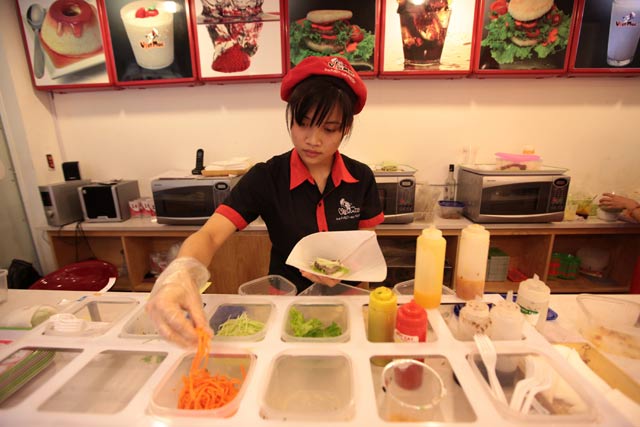A fast food chain reinvents the burger
By Marianne Brown
A young Vietnamese air hostess clasps a bun in her carefully manicured hands and bites into it. “It’s good,” she says. “Very healthy.” Not a typical response to fast food perhaps, but then this is no typical burger.

Fast food nation: Vietnam’s VietMac has taken the country by storm with its ‘rice-burger’. It now hopes to do the same thing in Europe
Rather, it is a Vietnamese response to a nation’s growing appetite for fast food, and it is a culinary business venture that is paying dividends. The VietMac burger has taken Vietnam by storm.
Made from two rice patties carefully squished over your choice of meat and salad, the meal is touted by company founder Ngo Trong Thanh as 100% additive-free and a healthy alternative to its bread-bun rival.
One year after VietMac first opened its doors, the chain has 12 outlets nationwide, and it is going global, with a franchise opening in Germany this summer.
Located in shopping malls and business districts and offering meals priced between $1.5 and $5, Thanh’s target market is typical of fast food chains: teenagers, single professionals and young families. Yet he insists VietMac offers something different.
“Young people already like fast food,” the 43-year-old says. “The burger is the symbol of fast food in the world. But I am giving them something that tastes like home. Vietnam is a country of rice cultivation. It was built on rice.”
Fitting with the Vietnamese custom of finding balance in food, the burger is served with a small bowl of soup. As such the VietMac burger appeals to traditional palates but adds a modern twist, combining popular Vietnamese ingredients with new recipes and new eating habits, says Tung Bui, director of the University of Hawaii’s Hanoi MBA programme.
“Food reflects culture. Culture evolves,” he says. “VietMac fits well the trend and need for an emerging economy where people have less time to eat. Food should reflect the new generation.”
With a large population, rising wealth and an increasing thirst for modern brands, the Vietnamese market has all it takes to attract global food makers. Coffee Bean & Tea Leaf, Subway and Pizza Hut have a presence in the country through a franchise agreement with IFB Holdings, a privately held
Vietnamese company. KFC entered Vietnam in 1997 and claims to be the leader with a 60% share of the fast food market, and about 100 outlets throughout the country – a number the company wants to double by 2015.
Asian cuisine also has its representatives with Jollibee, the largest Philippine fast-food company, and the Japanese shrimp hamburger pioneer Lotteria, which invested around $20m to build a 100-outlet Vietnamese network.
Yet fast food has been slower to come to Vietnam than to neighbouring countries such as Thailand, and some big names have until recently been notably absent from the malls. Burger King only opened its first restaurant at Tan Son Nhat Airport in Ho Chi Minh City in November last year.
“Brands don’t just enter markets, they do a lot of research first, whether it’s economical or political,” said Tony Cricenti, CEO of Domino’s Pizza Vietnam. “But because you are dealing with food, the infrastructure has to be available to ensure the high standards of quality.
“Vietnam is on the radar for a lot of brands now because they feel the timing is right to enter the market.”
According to market research company Euromonitor International, the fast food market displayed a growth of 13%, to reach 7.1 trillion dong in 2010, or $355m (at the December 2010 exchange rate).
With the world’s largest chain of hamburger fast food restaurants yet to enter the market, Thanh was able to register the VietMac trademark in Vietnam and does not expect any copyright backlash.
However, McDonalds’ monopoly on the prefix ‘Mc’ in other parts of the world could spell trouble for Thanh’s global expansion plans, which is why he has also trademarked ‘Vietburger’.
“For me, when it comes to selling VietMac abroad, the word ‘Viet’ is the most important,” Thanh says.
Having won over Vietnamese consumers, the company is preparing to open its first overseas outlet, with a 50-seat restaurant in Berlin. But for Thanh, the VietMac invasion won’t end there. As he negotiates a franchise in London, Thanh is confident his burger will become a new fast food staple.
“I want people all over the world to enjoy VietMac,” he says.
